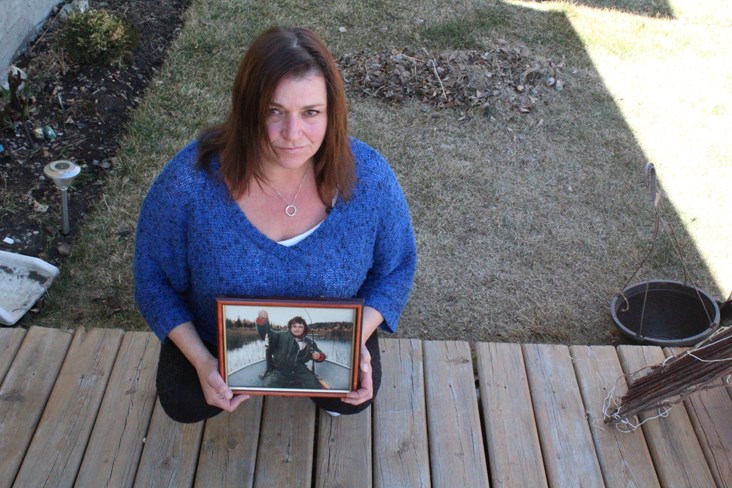April 28 is a day like any other for most, for others it's one of sombre reflection. For Sally Curnow, the National Day of Mourning has her remembering the loss of her brother and only sibling, Ian Curnow, who died nearly 28 years ago, due to a tragic and preventable workplace accident. "I reflect a lot ... I think of all the people who have gone through the same thing. My brother's death was 100 per cent preventable." The annual day of recognition is held in honour of workers who were killed, injured or disabled on the job. Last year in Alberta, 166 workers were lost to injury or illness. For Sally, the death of her brother on Sept. 13, 1990 in a mining accident in Yellowknife, N.W.T. was a life-changing event that altered the course of her family's life – prompting her and her late father, Keith, to advocate for industry safety improvements. "At every job there's risk, but it's about minimizing that risk ... my dad and I fought for a lot of changes," said Sally, showing yellowed newspaper clippings featuring stories about her family's advocacy in the media to improve industry safety. Their quest was bolstered by union support, including the N.W.T. Federation of Labour. Ian's death was a result of carbon monoxide poisoning, after a surface air compressor used to pump air underground caught fire and spilled the poisonous fumes down into the mine shaft where the 22-year-old was working at the Treminco Resources Ptarmigan Mine near the N.W.T. capital; it was a small, non-unionized mine. The owner of the mine where Ian was killed, Roland Trenaman, pleaded guilty to 10 charges of violating the territorial Mine Safety Act. The result was a $22,000 fine. The family did begin a civil suit in Supreme Court against the mining operator and the territorial government, which was eventually dropped due to the family's exhaustion. A coroner's inquest prompted by the family into Ian's death resulted in a jury finding 25 recommendations to prevent future mining deaths, largely related to safety orientations, improved communication with miners underground and training enhancements. The end result was five new mine safety regulations and revisions to eight others. The Curnows maintained that accountability must be placed on those in the field–- inspectors, supervisors and operators to ensure that safety protocols are being met and not simply text in a manual. All this took place two years before the famed Giant Mine bombing that killed nine miners in 1992, in the midst of an ugly labour dispute. The Curnow family emigrated from Cornwall, England, in 1979 to Cochrane, where Sally and Ian quickly got used to growing up in small-town Alberta. Sally said Ian naturally gravitated to the cowboy way of life and was a born athlete – from riding bulls to strapping on hockey skates. Following a shortage of construction work, the family travelled north to work in the booming mining industry in the late 1980s – where Ian quickly got a taste for working long hours underground for big bucks, following in the footsteps of his mining father. "It was a big shock for my dad – he couldn't let it go ... I really feel like after Ian died, a part of my dad died," said Sally, admitting that it took many years to let go of her own anger over Ian's death and acknowledges that she has likely lived all these years with survivor's guilt. "I don't think I could have lived with myself if I didn't speak up ... but that's something my dad instilled in me a long time ago," she said, when asked if the advocacy helped or hindered her healing process. Sally and her three kids moved back to Cochrane after her father's untimely passing in 1998, along with Sally's mother Denise. Keith died suddenly of a stroke at the age of 51. Over the years, Sally has become a well-known bartender in town - for many years at the Cumbrian Arms, which her mother owned for several years, and the last five at Ducks on the Roof sports pub. To this day, Sally keeps in contact with childhood friends who remember her brother well, including Kirk Schmitke. Schmitke was Ian's best friend. Nearly three decades following the loss, Schmitke realizes he knows of too many lives unnecessarily lost from his years spent working in high risk jobs such as sour oil fields, pipe fitting, heavy equipment operations and relocation. "We were best buddies – that was a devastating blow, that one," said Schmitke, adding that he visits Ian each year when he takes a motorcycle trip to Vancouver Island, where he always stops in Duncan to visit the gravesides of Ian and Keith and sit on the granite bench donated by the workers from the N.W.T. The Curnow family had all planned to end up in Duncan. Schmitke said the jolt of losing his best friend at such a young age impacted his own take on safety in the years to come, reminding him to never become complacent on job sites or be blindsided by the bottom dollar. "There's no reason for people to go to work and not come home to their families ... I feel like the majority of workplace deaths are preventable," he said, adding that while safety standards have improved he remains concerned that in boom and bust times, there is a lack of proper training in many industries. Schmitke said he has known several people who have died at work over the years – from guys getting crushed by heavy equipment to exposure to sour gas. Many of these deaths were preventable. "I think more training is the answer ... at the end of the day, everybody needs to get home safely, said Schmitke, a sentiment echoed by Sally. In 2016, 905 workplace deaths occurred across Canada, as well as 241,508 claims filed with Workers' Compensation Board due to workplace injury or disease.




